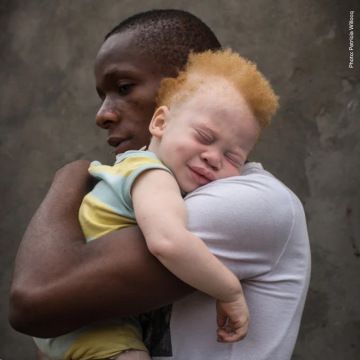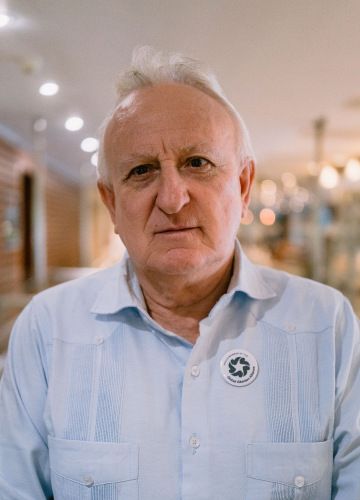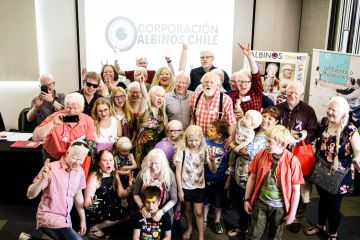September 5, 2025
Global Albinism Alliance Celebrates Historic WHO Approval of Sunscreen as Essential Medicine, Strengthening Global Fight Against Skin Cancer in Person

In a monumental victory for the albinism community, the Global Albinism Alliance (GAA), led by Executive Director Antoine Gliksohn, proudly announces the World Health Organization’s (WHO) approval to include broad-spectrum sunscreen on the 24th edition of the Model List of Essential Medicines (EML) and 10th edition of the Model List of Essential Medicines for Children (EMLc).
This landmark decision, the GAA’s first global success since its founding in the USA, 11 October 2021, marks a transformative step in protecting persons with albinism (PWAs) from the devastating effects of skin cancer caused by ultraviolet (UV) radiation.
This achievement sets the stage for the ‘1st World Forum on Skin Cancer Prevention and Management in Persons with Albinism,’ to be held in Cape Town, South Africa, 27-28 October 2025. Co-organized by the GAA, the International League of Dermatological Societies (ILDS), and Standing Voice, with support from the Pierre Fabre Foundation, the Forum will harness this milestone to develop a global prioritized action plan to enhance skin cancer prevention and management for PWAs.
For further information, please contact:
ross@albinismalliance.com
The inclusion of broad-spectrum sunscreen in the WHO EML and EMLc follows a rigorous global campaign and application submitted in November 2024 by the GAA, in partnership with the United Nations Independent Expert on the Enjoyment of Human Rights by Persons with Albinism, the Special Rapporteur on the Promotion and Protection of Human Rights in the Context of Climate Change, and esteemed collaborators, including Standing Voice, Beyond Suncare, the Pierre Fabre Foundation, the ILDS, and the Africa Albinism Network. This collaborative global effort underscores the power of multi-stakeholder partnerships in advancing health equity for PWAs.
The WHO EML and EMLc, updated biennially, serve as globally recognized frameworks identifying medicines deemed safe, effective, and critical to addressing priority health needs within national health systems. Inclusion on these lists signals to governments, health authorities, and donors that a medicine is indispensable for public health, guiding national health policies, procurement strategies, and resource allocation.
For PWAs, who lack melanin pigmentation and face heightened susceptibility to UV-induced skin cancer, the designation of broad-spectrum sunscreen as an essential medicine is a game-changer. It elevates sunscreen from a perceived luxury to a fundamental health intervention, paving the way for improved affordability, streamlined distribution, and integration into national healthcare systems, particularly in high-UV, low-resource regions where access to sun protection is often limited.
For albinism organizations worldwide, this decision provides a powerful advocacy tool to push for the inclusion of sunscreen in national essential medicines lists. It also enhances the ability of these organizations to secure funding, partner with health ministries, and implement scalable prevention programs. By aligning sunscreen with other critical medications, the WHO’s decision strengthens the case for prioritizing skin cancer prevention, fostering global collaboration and resource mobilization to address this urgent public health issue.
“The WHO’s landmark decision to classify sunscreen as an essential medicine is a game-changer for hundreds of thousands with albinism at risk of deadly skin cancer,” said Antoine Gliksohn, Executive Director of the Global Albinism Alliance. “Driven by our community’s fierce advocacy, this victory demands urgent global action to deliver affordable sunscreen. At our Cape Town Forum, we’ll continue to rally to end this preventable crisis and secure a future where persons with albinism can thrive.”
For albinism organizations, particularly in regions with high UV exposure and limited healthcare infrastructure, this milestone unlocks new opportunities to address systemic barriers. The WHO’s endorsement provides a robust framework for these organizations to engage with national governments to integrate sunscreen into public health programs, negotiate bulk procurement, and secure subsidies, making this life-saving intervention accessible to PWAs in low-income settings. It also strengthens their advocacy for recognizing skin cancer in PWAs as a WHO Neglected Tropical Disease, which will further amplify attention and resources to this under-addressed health crisis.
The GAA is committed to supporting albinism organizations worldwide by sharing advocacy strategies, fostering capacity building, and promoting education on sun protection measures, including sunscreen, UV-protective clothing, and hats.
This decision also galvanizes efforts to develop global standards for monitoring and addressing the burden of skin cancer in PWAs, ensuring that interventions are evidence-based and scalable.
“This milestone is a clarion call for governments and health systems to prioritize the right to health for PWAs,” said Valerie McCormack, Environment and Lifestyle Epidemiology Branch, IARC. “Sunscreen is a cornerstone of survival for PWAs, and its inclusion on the WHO Essential Medicines Lists equips albinism organizations with the authority to demand equitable access to this critical intervention.”
Harry Freeland, Executive Director of Standing Voice, added: “The WHO’s decision validates decades of grassroots efforts to deliver sunscreen to PWAs in underserved regions. For albinism organizations, this is a catalyst to strengthen local health systems, secure funding, and save lives by ensuring sustainable access to sun protection.”
For PWAs like Constance Katihabwa from Burundi, the impact is profound: “Sunscreen shields me from burns and cancer, giving me the freedom to work and live with dignity. This decision means hope for countless others like me who deserve a life without fear of the sun.”
The 1st World Forum on Skin Cancer Prevention and Management in Persons with Albinism will convene global experts, policymakers, and advocates to develop strategies for reducing the burden of skin cancer on PWAs. Aligned with the ILDS World Skin Summit (27-28 October 2025), the Forum will foster knowledge exchange, build global networks, and drive actionable outcomes to ensure equitable access to prevention and treatment.
The GAA calls upon governments, international organizations, and philanthropic entities to invest in research, policy implementation, and scalable programs to protect PWAs from skin cancer. This historic WHO decision marks a pivotal moment in the global movement for health equity, and the GAA invites all stakeholders to join this transformative effort at the Cape Town Forum.
SUBSCRIBE FOR UPDATES ON THE GLOBAL ALBINISM ALLIANCE’S WORK WORLDWIDE
By entering your email and clicking “Submit,” you agree to receive updates from the Global Albinism Alliance about our work. For details on how we use and protect your information, please see our privacy policy.





